
A college is an educational institution or a constituent part of one. A college may be a degree-awarding tertiary educational institution, a part of a collegiate or federal university, an institution offering vocational education, a further education institution, or a secondary school.
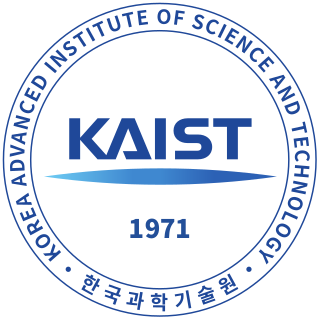
The Korea Advanced Institute of Science and Technology (KAIST) is a national research university located in Daedeok Innopolis, Daejeon, South Korea. KAIST was established by the Korean government in 1971 as the nation's first public, research-oriented science and engineering institution. KAIST is considered to be one of the most prestigious universities in the nation. KAIST has been internationally accredited in business education, and hosts the Secretariat of the Association of Asia-Pacific Business Schools (AAPBS). KAIST has 10,504 full-time students and 1,342 faculty researchers and had a total budget of US$765 million in 2013, of which US$459 million was from research contracts.
A bachelor's degree or baccalaureate is an undergraduate degree awarded by colleges and universities upon completion of a course of study lasting three to six years. The two most common bachelor's degrees are the Bachelor of Arts (BA) and the Bachelor of Science. In some institutions and educational systems, certain bachelor's degrees can only be taken as graduate or postgraduate educations after a first degree has been completed, although more commonly the successful completion of a bachelor's degree is a prerequisite for further courses such as a master's or a doctorate.

The University of the Philippines is a state university system in the Philippines. It is the country's national university, as mandated by Republic Act No. 9500, giving it institutional autonomy.

Ateneo de Manila University, commonly referred to as Ateneo de Manila or Ateneo, is a private, Catholic, teaching and research university, and a basic education institution located in Quezon City, Philippines. Established in 1859 by the Jesuits, it is among the oldest Jesuit-administered institutions of higher education in the Asia-Pacific.
The Bachelor of Science in Nursing also known in some countries as a Bachelor of Nursing (BN) or Bachelor of Science (BS) with a Major in Nursing is an academic degree in the science and principles of nursing, granted by an accredited tertiary education provider. The course of study is typically three or four years. The difference in degree designation may relate to the amount of basic science courses required as part of the degree, with BScN and BSN degree curriculums requiring completion of more courses on math and natural sciences that are more typical of BSc degrees and BN curriculums more focused on nursing theory, nursing process, and teaching versions of general science topics that are adapted to be more specific and relevant to nursing practice. Nursing school students are generally required to take courses in social and behavioral sciences and liberal arts, including nutrition, anatomy, chemistry, mathematics, and English. In addition to those courses, experience in physical and social sciences, communication, leadership, and critical thinking is required for a bachelor's degree. BSN programs typically last 2–4 years. Someone who holds a BSN can work in private or public medical and surgical hospitals, physician's offices, home health care services, and nursing facilities. Having a BSN can result in more opportunities and better salary than just an associate degree.
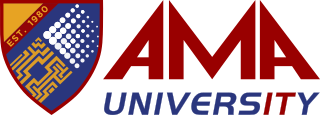
AMA University, also known as AMA Computer University (AMACU) or simply AMA, is a private, nonsectarian, for-profit university in Quezon City, Philippines.
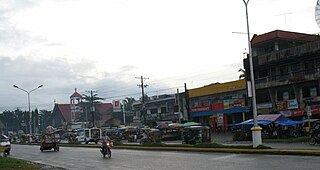
Bayugan, officially the City of Bayugan, is a 5th class component city in the province of Agusan del Sur, Philippines. According to the 2020 census, it has a population of 109,499 people..

Jamia Hamdard is an institute of higher education deemed to be university located in New Delhi, India. Established in 1989, it is a government-funded university and was formally inaugurated by then Indian prime minister Rajiv Gandhi. In 2019, it was awarded Institute of Eminence status by Ministry of Human Resource Development.

The University of the Philippines Cebu is a public research university and the youngest constituent university of the University of the Philippines System located in Cebu City, the capital city of Cebu province in the Philippines.

Trinity University of Asia, also known as TUA or simply Trinity, is a non-sectarian private university located in Quezon City, Philippines. It was named after Trinity College (Connecticut) whose president then was the founder's father. Formally established in 1963 as an elementary, high school and collegiate educational institution by the Protestant Episcopalians, it dates back its earliest establishment in 1907 when the Trinity University of Asia - St. Luke's College of Nursing, its oldest organic academic unit, was established under the St. Luke's Hospital, the present day St. Luke's Medical Center. It later acquired its university status on July 18, 2006.

The Philippine Normal University is a public coeducational teacher education and research university in the Philippines. It was established in 1901 through Act No. 74 of the Philippine Commission "for the education of natives of the Islands in the science of teaching". It has campuses in Manila, North Luzon, South Luzon, Visayas, and Mindanao. Pursuant to Republic Act No. 9647, it is the country's National Center for Teacher Education.
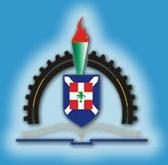
The Presbyterian University, Ghana is a partially private & public university with multi- campuses and its headquarters located at Abetifi-Kwahu in the Eastern Region of Ghana. It is one of the new universities in Ghana granted accreditation by the Ghana Tertiary Education Commission – GTEC. It was established by the Presbyterian Church of Ghana (PCG) on 23 November 2003 and inaugurated on 27 March 2004 by the former president of Ghana in that republic, John Agyekum Kufuor.

Asian College of Technology, officially the Asian College of Technology - International Educational Foundation, is a private college in the Philippines, located in Cebu City and Talisay City, in the Cebu province.
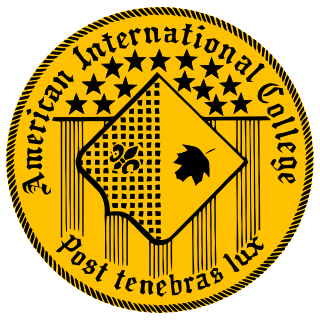
American International College (AIC) is a private university in Springfield, Massachusetts.
A Bachelor of Science in Information Technology,, is a bachelor's degree awarded for an undergraduate program in the information technology. The degree is normally required in order to work in the Information technology industry.

Colegio de Montalban is a government-funded university in Kasiglahan Village, Rodriguez, Rizal, Philippines. It was established on September 25, 2003 by virtue of Municipal Ordinance No. 03-24, and approved by the Sangguniang Bayan ng Rodriguez to provide vocational-technical and higher education to help alleviate poverty.
The education system in Lahore is formulated along specific modern, religious, cultural, social, psychological, commerce and scientific injunctions. Lahore is Pakistan’s largest producer of professionals in the fields of science, technology, IT, engineering, medicine, nuclear sciences, pharmacology, telecommunication, biotechnology and microelectronics. Most of the reputable universities are public, but in recent years there has also been an upsurge in the number of private universities. The current literacy rate of Lahore is 64%. The standard national system of education is mainly inspired from the British system. The system also aims to imbibe a secular outlook among the students with the awareness of the rich cultural heritage of Pakistan. Lahore has a wide range of schools, colleges and universities that caters to diverse streams.

ESOFT Metro Campus is a private sector educational institute or college located in Colombo, Sri Lanka. It offers academic and professional qualifications in Computing, Business & Management, Engineering, Hospitality and English. Established in the year 2000, the company today has 40 branches nationwide. It is headed by Dr. Dayan Rajapakse.



















